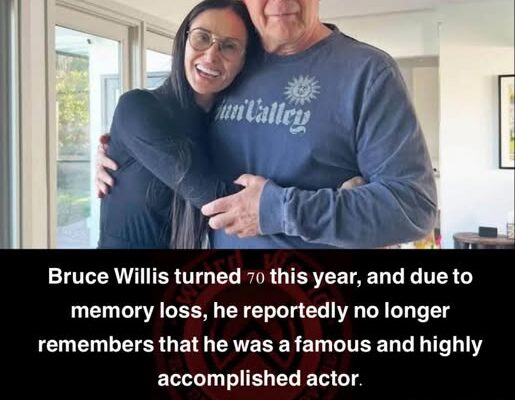On Father’s Day 2025, emotions ran high as Bruce Willis’ eldest daughter, Rumer Willis, shared a touching message about her father—Hollywood legend and beloved dad—who is courageously battling frontotemporal dementia (FTD).
Through her words, we were given a rare, emotional glimpse into the reality of loving someone who is slowly slipping away, not physically, but mentally and emotionally. “I miss our talks. I miss the stories. I miss my dad,” Rumer wrote. It wasn’t just a message—it was a cry from the heart of a daughter who’s grieving the slow loss of a parent who is still here, but not in the same way.
💬 A Voice Slowly Lost: The Struggle With FTD
Bruce’s wife, Emma Heming Willis, has also been a pillar of strength, openly sharing the family’s journey with compassion and honesty. In a recent interview, she revealed the most painful part: not knowing whether Bruce even understands what’s happening to him anymore.
Frontotemporal dementia is especially cruel. Unlike Alzheimer’s, it primarily affects language, behavior, and personality. Over time, Bruce’s ability to communicate, recognize loved ones, and respond to the world around him has faded—turning everyday interactions into silent battles.
Emma’s plea to the public and the media is simple, yet deeply moving: “Please don’t yell at him. Don’t chase him. He doesn’t understand anymore, and you’re scaring him.”
👨👩👧 A Family’s Resilience in the Face of Loss
In the wake of Bruce’s condition, the Willis family has come together in ways they never imagined. They’ve created a new kind of love—a quieter, gentler, more patient love. One that doesn’t rely on words, but on presence. On sitting beside him in stillness. On holding his hand. On finding joy in his smile, even if it’s rare.
Despite their private pain, the Willis family has made a conscious choice to share this journey with the world. Not for sympathy, but to raise awareness. To help others understand what dementia looks like—not just in medical terms, but in the moments it steals from families. In the conversations that no longer happen. In the stories that will never be told again.
🧠 Understanding Frontotemporal Dementia
FTD is a lesser-known form of dementia, but it’s one of the most devastating—often striking people in their 40s, 50s, or early 60s. It erodes the parts of the brain responsible for language, decision-making, and empathy. And unlike Alzheimer’s, memory often remains intact—at least at first—while the ability to communicate and behave appropriately vanishes.
For Bruce, this meant stepping away from the spotlight far earlier than he or his fans had ever imagined. It meant missing out on reading bedtime stories to his youngest daughters. It meant his family had to learn a new language of love—one made of silence, touch, and fierce loyalty.
📢 Share Their Story, Raise Awareness
The Willis family’s decision to speak out about Bruce’s condition is more than brave—it’s transformational. Their transparency has ignited a global conversation about dementia, the importance of early diagnosis, and the emotional toll it takes on families.
Their story reminds us that dementia doesn’t just take away memories—it robs people of connection, identity, and voice.
So on this Father’s Day and every day after, let’s honor Bruce’s legacy—not just as an actor, but as a father, husband, and fighter—by raising awareness, showing compassion, and supporting families facing the same quiet heartbreak.



